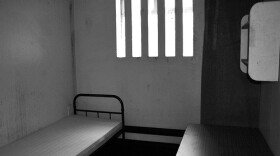Bills to offer a pension to state corrections officers are en route to the governor’s desk after passage by legislators during the lame duck session in Lansing. The union for officers advocated for the legislation for months, and says if made law, it could help improve prison staffing levels that are in some cases dangerously low.
The state says 12 prisons have staff vacancies in at least 20% of its listed positions for officers. Five prisons have officer vacancy rates above 30%. The Michigan Corrections Organization union, its officers, and some local lawmakers have long said staffing issues were exhausting officers who regularly receive mandatory overtime shifts, sometimes multiple days in a row.
Corrections organization President Byron Osborn said many officers recently resigned because mandatory overtime assignments put too much pressure on their families, and personal health. He thinks the pension offering, should it become law, could be “extremely impactful” on officer recruitment and retention.
The package of bills would allow corrections officers and certain other workers to join the Michigan State Police retirement system, which offers an option of a defined benefit pension.
“This is going to change the minds of folks who are contemplating leaving because now they're gonna have something to work towards,” Osborn said. “We’re quite certain this is going to greatly improve our ability to recruit people into the job, knowing they’re supposed to retire with benefits … and this is a good career choice.”
The Michigan Department of Corrections has for years, like many employers, only offered 401(k)-like retirement contribution plans to its employees. A pension is a promised defined retirement benefit considered less exposed to market variability than individual investment accounts. Osborn says the benefits haven’t been good enough to stop people from leaving.
“Folks aren’t willing to stay in when they can secure the same type of benefit package and similar pay at a far less dangerous job,” Osborn said. “For some of these folks, it’s a no brainer. It’s dangerous work.”
Pay for corrections officers starts at $22.77 per hour and increases to an annual salary of $68,515 after 3.5 years of service. Osborn says officers are regularly attacked and seriously assaulted.
While praising the legislature’s passage of the bills, Representative Dave Prestin (R-Cedar River) said in a press release alongside other U.P. lawmakers that he had seen an “alarming report” indicating that many of the Department of Corrections recent recruits left their jobs within the first year.
“The hard truth is our prisons are unsafe because they are understaffed, and our officers are unappreciated and overworked,” Prestin said in the statement. “Since the department has not fixed the situations, the Legislature has a duty to step up.”
State Senator Ed McBroom, in the same press release, said more should be done.
“The state and department must go beyond just providing a better retirement,” McBroom said. “Starting pay, working conditions, and post-employment health care must also be improved.”







